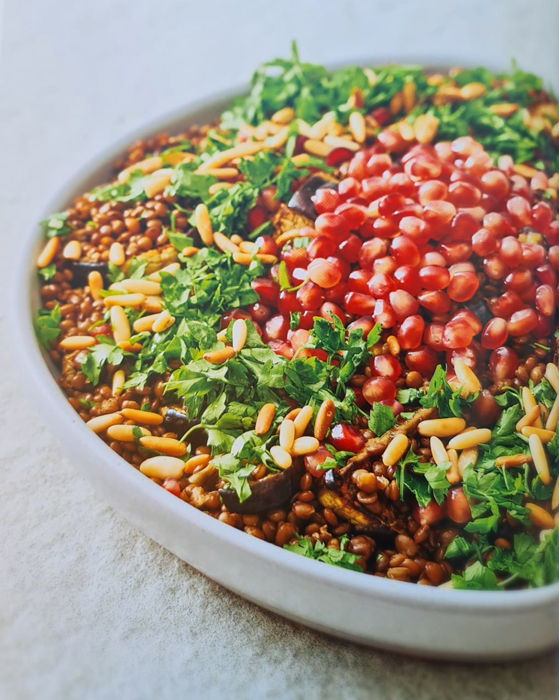The cover photograph of the new cookbook occupying centre space on a shelf in the little Diwan Bookstore seemed to beckon readers, with its brilliant explosion of colour. Ruby-red pomegranate seeds dotted with little green leaves of parsley lay on a bed of earthy black lentils, highlighted with glistening white pine nuts.
Bilhana: Wholefood Recipes from Egypt, Lebanon, and Morocco, the title read. Wholefood appealed to the health-buff in me and to an aficionado of traditional culinary heritage, which in our part of the world, Egypt and the countries of the Levant and North Africa, relies mainly on grains, pulses, and vegetables.
Bilhana is the closest Arabic rendering to the French expression bon appetit. Except that in Arabic the full phrase that people will say to wish someone a hearty repast is bilhana wa-l-shifa, whose literal translation is “with enjoyment and healing.”
The expression seems to evoke a piece of deep-rooted cultural wisdom — that good food will bring with it not only enjoyment, but also well-being and good health.
It is upon this premise that Bilhana authors Yasmine and Shewekar Elgharably, two Egyptian sisters with versatile interests spanning cultural heritage, lifestyle, and entrepreneurship, have honed their take on traditional recipes in this book.
It underscores ingredients such as nuts, herbs, spices, whole grains, pulses and vegetables. All of these are foods that today have come to be recognised as valuable for the health benefits they hold. From roasted figs and nuts to baked whole fish with tahini and coriander, and from green beans with onions to quinoa tabouleh with pickled lime, the book presents an array of vegan, vegetarian, and protein-based dishes.
Most of the choices for recipes in the book are home-grown. The authors’ mother, in her own right an accomplished and health-conscious cook, used to present her family with Lebanese, Moroccan, and typically Egyptian food while at the same time steering clear of deep frying and the use of hydrogenated oils, Yasmine Elgharably told me.
The recipes in the book have been developed to suit the modern and health-conscious cook, presenting a versatile array of salads, vegetables, and grain combinations and proteins. The separate ingredients in each dish are underscored rather than overly-blended or overcooked.
Olive, coconut, and sesame oils are the ingredients of choice, in addition to lactose-free ghee or samn, which avoids the harms associated with hydrogenated oils.
Valuable tips are given in the book’s introduction, from which we learn, for instance, that “a versatile, good-quality all-purpose olive oil is so much better for you than a cheap extra-virgin one.” Importantly, space is given to traditional and until recently “largely underrated and little-known” highly nutritious foods to which the epithet of “superfoods” may be applied, such as “our very own Egyptian fireek,” Elgharably says, referring to an Egyptian dish of rubbed wheat a bit like bulgur wheat.
The layout of the book gives ample room for the often-detailed and elaborate recipes, but it also has an appealing Zen-like spaciousness where every recipe is countered on the opposite page with the mesmerisingly beautiful food photography of Yehia El-Alaily.
The images are clean, minimalist, and modern-looking, while at the same time portraying locally-made utensils that, in a strangely paradoxical manner, unabashedly, yet at the same time subtly, display little chips and scars from actual use – as opposed to some of the teflon-clean and perfectly unrealistic props used in other books.
This is a beautifully crafted book, both visually and in terms of content, and I do not hesitate to say that I have fallen in love with it. I have yet to try out all its recipes, but presented below is the one whose photograph is featured on the book’s cover – warm lentil, eggplant, and pomegranate salad.
This is a Levantine salad which offers a hefty dose of vitamins, fibre, and minerals, as well as a protein content boosted by the manner in which the foods have been combined.

Warm lentil, eggplant, and pomegranate salad
Warm lentil, eggplant, and pomegranate salad
Ingredients:
400 g (14 oz) brown lentils (about two cups)
One teaspoon ground cumin
Salt and pepper
Three eggplants, cubed
Four tablespoons olive oil
Three garlic cloves, minced
Four tablespoons of pomegranate molasses
Handful of pomegranate seeds
Handful of parsley, stalks removed and roughly chopped
Method:
Pre-heat the oven to 180 degrees C (350 degrees F / gas mark four).
Put the lentils, cumin, and five cups of water to cover in a medium pan. Bring to the boil, lower the heat, cover and simmer for about 30 minutes, or until the lentils are cooked through.
Season with salt and pepper. Arrange the eggplant cubes in one layer on an oven tray. Brush with two tablespoons of olive oil.
Place in the middle of the oven for 20 to 25 minutes, turning halfway through. Turn the heat to low and heat the remaining olive oil in a small skillet over a medium heat. Add the minced garlic and cook for a couple of minutes until golden (but not brown). Add the hot fired garlic, roast, and add the eggplant and pomegranate molasses to the pan of lentils and stir. Cook for another five minutes. Add the lime juice and remove from the heat.
Tip into a deep serving dish and garnish with the pomegranate seeds, a drizzle of olive oil, and the chopped parsley. Serve warm.
Yasmine Elgharably, Shewekar Elgharably & Yehia El-Alaily (photographer), Bilhana: Wholefood Recipes from Egypt, Lebanon, and Morocco, Cairo: AUC Press, 2021, pp140.
*A version of this article appears in print in the 12 August, 2021 edition of Al-Ahram Weekly
Short link: